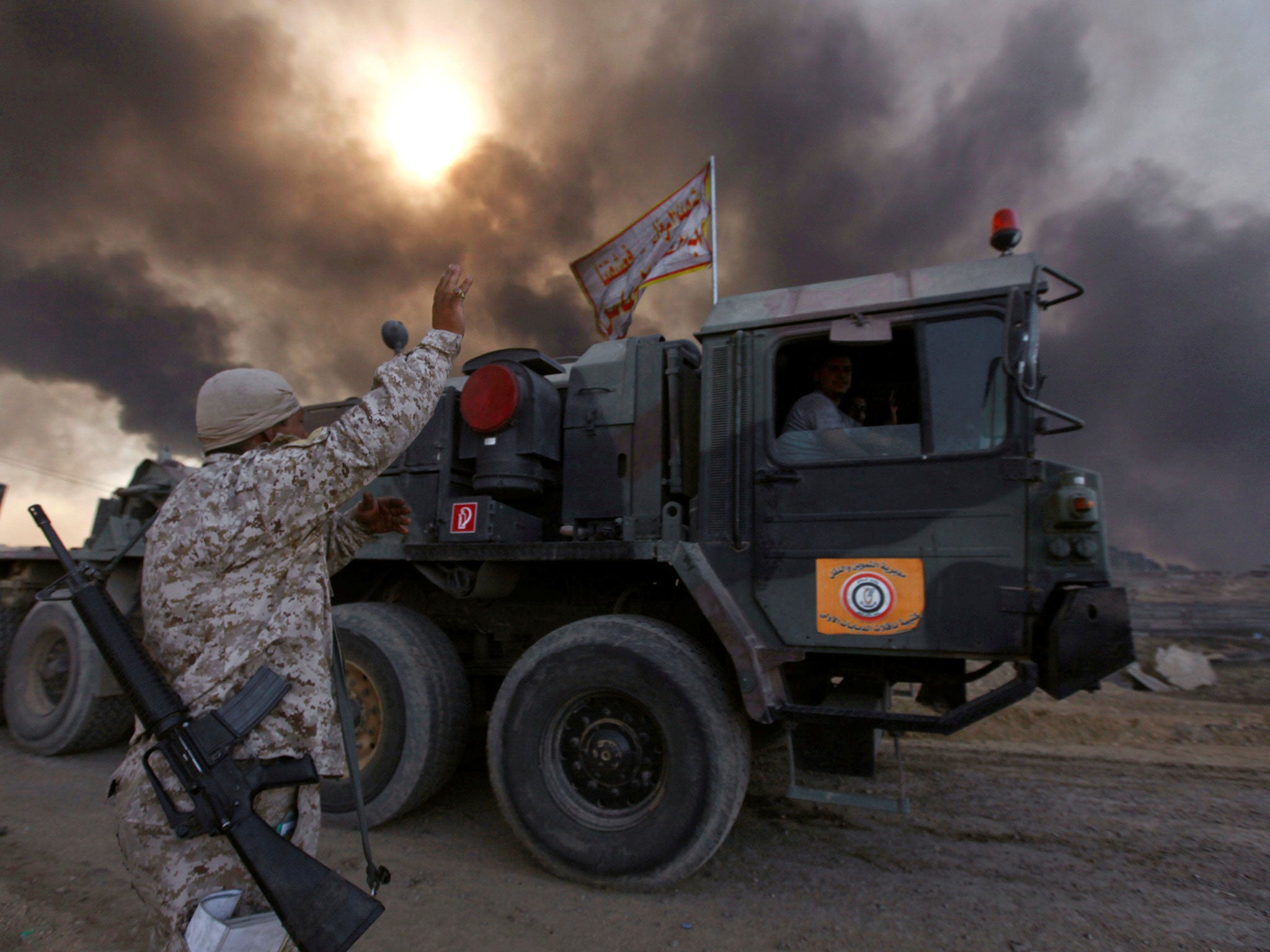Iraqi forces just three miles outside Mosul after dawn offensive on Isis
Sunday’s dawn offensive on two fronts northeast of Isis-held city makes impending battle to oust group imminent but progress hampered by toxic fumes released by Isis' bombing of sulphur plant

Your support helps us to tell the story
From reproductive rights to climate change to Big Tech, The Independent is on the ground when the story is developing. Whether it's investigating the financials of Elon Musk's pro-Trump PAC or producing our latest documentary, 'The A Word', which shines a light on the American women fighting for reproductive rights, we know how important it is to parse out the facts from the messaging.
At such a critical moment in US history, we need reporters on the ground. Your donation allows us to keep sending journalists to speak to both sides of the story.
The Independent is trusted by Americans across the entire political spectrum. And unlike many other quality news outlets, we choose not to lock Americans out of our reporting and analysis with paywalls. We believe quality journalism should be available to everyone, paid for by those who can afford it.
Your support makes all the difference.Kurdish peshmerga forces have managed to drive Isis fighters into retreat towards the city of Mosul in a twin dawn offensive, although progress has been hampered by clouds of toxic smoke unleashed when Isis set a sulphur plant alight.
An almost 30,000 strong coalition of US-supported Kurdish fighters, Shiite militias, Sunni tribal fighters and the Iraqi army have edged their way closer to the city on three fronts since the much-heralded offensive to liberate it began on Monday. Following the new push by the peshmerga near the town of Bashiqa on Sunday and the retaking of Christian villages to the east of the city, in some places the frontline is now just three miles (five kilometres) away from the city’s outskirts.
Fighting has been fierce: Isis has deployed car bombs, suicide bombers and roadside landmines to try and slow the Iraqi operation, as well as launching a diversion atttack on Kirkuk, 100 miles away from Mosul.
On Saturday Isis blew up a sulphur plant south of the city, sending plumes of toxic smoke into the air which extended over a wide area of the surrounding Nineveh plain. More than 1,000 locals had to be treated for respiratory difficulties and at least two people have died as a result, an emergency services doctor said.
Mosul, Iraq’s second largest city, fell under Isis control in 2014. The UN and aid agencies have raised concerns for its estimated 1.5million inhabitants, who could be caught in the crossfire when the battle reaches the city proper.
Residents have reported that the around 4,000 fighters inside the city are well prepared for battle with an extensive tunnel network and boobytrapped roads and bridges in a struggle for control that could last months.
Around 6,000 people have fled the city so far, but up to 700,000 are expected to try to escape the impending fighting. On Saturday, reports emerged that 284 men and boys in the city were executed on suspicion of trying to rebel against the city’s captors.
US Defence Secretary Ash Carter arrived in the northern city of Irbil on Sunday to meet with Kurdish and Iraqi military leaders to discuss the offensive’s progress, which he said was "on schedule".
Defeat would be the deathblow to Isis in Iraq after significant military gains against the group in recent months in the north of the country and in neighbouring Syria, and has major implications for the legacy of outgoing US President Barack Obama.
Even if Mosul is freed from Isis’ control, observers are worried that sectarian divisions could be exacerbated by the complex and competing interests of the Iraqi coalition forces, leading to further unrest.
Join our commenting forum
Join thought-provoking conversations, follow other Independent readers and see their replies
Comments